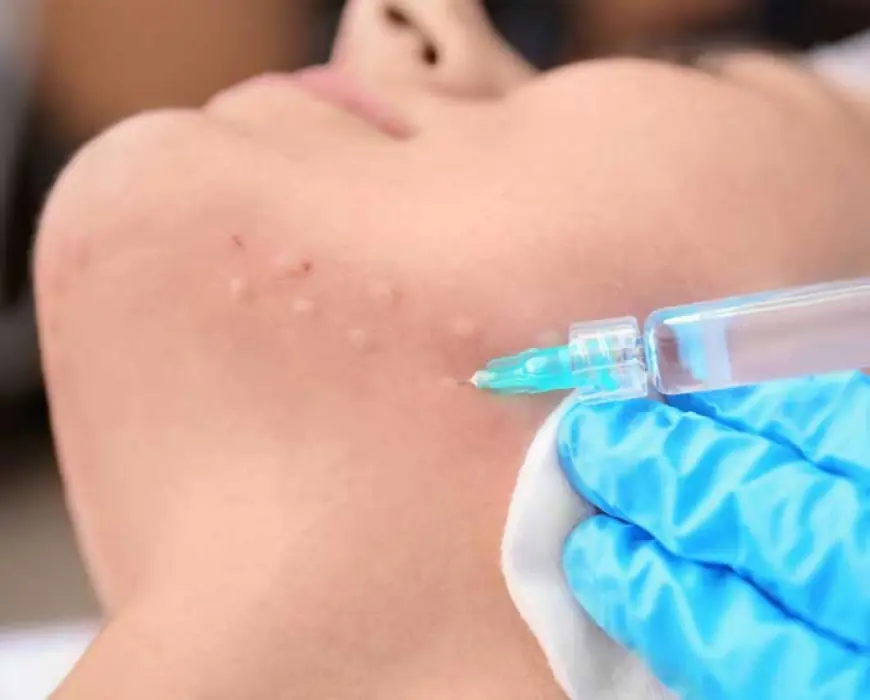Mesotherapy vs. Hair Transplant: Which Is Better?
Say goodbye to dull skin—Mesotherapy boosts hydration, collagen, and radiance with micro-injections targeting deep skin layers.

When dealing with hair thinning or bald patches, choosing the right treatment can be overwhelming. Two of the most widely discussed options are Mesotherapy treatment in Dubai(علاج الميزوثيرابي في دبي) and hair transplant. While both aim to restore hair and confidence, they differ significantly in approach, technique, recovery, and results. Many people ask, mesotherapy vs. hair transplant: which is better? The answer largely depends on your hair loss condition, goals, and expectations.
This in-depth guide compares both treatments, helping you understand their working mechanisms, who they're best suited for, and what to consider before making a decision. Whether you seek non-surgical rejuvenation or long-lasting regrowth, this article explores all angles to determine which option may be right for you.
What Is the Treatment and How It Works
Mesotherapy for hair is a non-invasive procedure that involves injecting a customized cocktail of nutrients, vitamins, peptides, and amino acids into the mesoderm layer of the scalp. The primary goal is to stimulate hair follicles, improve blood flow, and boost scalp health. It is typically used to treat early-stage hair thinning, diffuse hair loss, and weakened follicles.
On the other hand, a hair transplant is a surgical procedure where healthy hair follicles are extracted from a donor area (usually the back of the scalp) and implanted into bald or thinning areas. The most common techniques include FUE (Follicular Unit Extraction) and FUT (Follicular Unit Transplantation). Hair transplants offer a permanent solution to hair loss, especially in areas where follicles are completely inactive.
While mesotherapy rejuvenates existing follicles, hair transplantation replaces lost ones, making each treatment suitable for different stages of hair loss.
Importance of Understanding Treatment Differences:
Before selecting a treatment, it’s essential to understand their core differences to determine which aligns best with your needs. Here’s why:
-
Mesotherapy is ideal for preventive care and early intervention, focusing on hair quality, shedding control, and mild thinning.
-
Hair transplants are suited for advanced hair loss, where large bald patches or receding hairlines require permanent restoration.
-
Mesotherapy offers gradual, progressive results over multiple sessions.
-
A transplant provides immediate visual improvement once hair starts to grow in the implanted areas.
Knowing your scalp’s condition and treatment goals is critical to choosing the right path. In many cases, people may even use mesotherapy as a supportive therapy before or after hair transplant surgery.
Types of Mesotherapy and Hair Transplant Treatments:
Both mesotherapy and hair transplant procedures come in different forms, offering customization based on your hair and scalp needs.
Types of Mesotherapy Treatments:
-
Needle-based mesotherapy: Involves microinjections directly into the scalp.
-
Needle-free mesotherapy: Uses electroporation to deliver nutrients without puncturing the skin.
-
Growth factor mesotherapy: Includes bio-peptides and vitamins to stimulate dormant follicles.
-
Anti-hair loss mesotherapy: Contains DHT blockers and scalp-nourishing compounds.
Types of Hair Transplants:
-
FUE (Follicular Unit Extraction): Individual hair follicles are extracted and implanted, leaving minimal scarring.
-
FUT (Follicular Unit Transplantation): A strip of scalp is removed for follicle harvesting; more suitable for larger areas.
-
DHI (Direct Hair Implantation): A modified form of FUE offering more precision in implantation.
-
Body-to-scalp transplant: Uses hair from other body parts when scalp donor hair is limited.
The type of treatment within each category should be chosen based on your hair loss pattern, scalp condition, and personal preference.
Preparation Tips for Both Procedures:
Proper preparation ensures safer procedures and more effective outcomes, whether you choose mesotherapy or a transplant.
Before Mesotherapy:
-
Wash hair with a gentle shampoo the night before.
-
Avoid styling products like gels or sprays before the session.
-
Refrain from smoking and alcohol 48 hours prior.
-
Discuss allergies and medications with your practitioner.
-
Eat a light meal and stay well-hydrated.
Before Hair Transplant:
-
Stop blood thinners and alcohol at least a week before.
-
Arrange for time off work due to recovery.
-
Avoid caffeine and heavy meals before surgery.
-
Prepare for a scalp examination and possible trimming of donor hair.
-
Review realistic goals and post-surgery expectations.
The more prepared you are, the more smoothly your session will go, whether it’s a mesotherapy series or a full transplant procedure.
Aftercare for Faster Recovery and Best Results:
Both procedures require commitment to aftercare routines to protect your scalp and support healing.
Mesotherapy Aftercare:
-
Avoid hair washing for 24–48 hours.
-
Refrain from scratching, rubbing, or touching the scalp.
-
Do not expose your head to direct sunlight or saunas for a few days.
-
Use only mild, sulfate-free shampoos.
-
Follow any supplement or topical serum recommendations.
Hair Transplant Aftercare:
-
Keep the transplanted area dry and untouched for at least 2–3 days.
-
Sleep with head elevated to reduce swelling.
-
Use saline sprays or prescribed medications as directed.
-
Avoid exercise, heavy sweating, and sun exposure for about 10 days.
-
Expect shedding of implanted hairs in the first few weeks before regrowth begins.
Post-treatment care is crucial to maximize mesotherapy results or ensure successful graft survival after transplant surgery.
Ideal Candidates for Each Treatment:
Choosing the right treatment starts with knowing who is best suited for each approach.
Ideal Candidates for Mesotherapy:
-
Individuals with early signs of hair thinning
-
Men and women experiencing seasonal or stress-induced shedding
-
People with diffuse hair loss or telogen effluvium
-
Those looking to enhance hair texture and scalp health
-
Users combining it with PRP or microneedling for synergy
Ideal Candidates for Hair Transplants:
-
People with permanent bald spots or receding hairlines
-
Those with sufficient donor hair at the back or sides of the scalp
-
Individuals who seek a long-lasting and fuller hair restoration
-
Those who have exhausted non-surgical options
-
People in good health, with realistic expectations
Understanding where you fall within the hair loss spectrum helps determine if you should start with mesotherapy or go straight for a transplant.
How to Choose the Right Clinic for Either Procedure?
Whether considering mesotherapy or hair transplantation, selecting the right clinic is essential to your satisfaction and safety. Look for:
-
Clinics offering both surgical and non-surgical options
-
Scalp analysis and personalized treatment plans
-
Experience with different types of hair loss conditions
-
Sterile and comfortable treatment environment
-
Access to before-and-after case studies
Check online reviews, ask for consultation sessions, and evaluate the clinic’s commitment to educating you about treatment choices. The clinic should help you decide whether mesotherapy or transplant suits your specific needs.
Risks and Side Effects of Each Procedure:
Every hair restoration method carries its own set of risks. While both are considered safe, being aware of possible side effects helps manage expectations.
Mesotherapy Risks:
-
Mild redness or swelling at the injection site
-
Temporary itching or scalp sensitivity
-
Rare allergic reaction to ingredients
-
Slight bruising or irritation
Hair Transplant Risks:
-
Swelling, bleeding, or infection
-
Temporary numbness around the donor area
-
Scarring, especially in FUT
-
Unnatural-looking hairlines if done improperly
-
Shock loss (temporary shedding post-surgery)
These risks are significantly reduced when the procedure is performed by experienced professionals using proper techniques and hygiene.
Benefits of Mesotherapy vs. Hair Transplant:
Each treatment has unique advantages depending on what you hope to achieve.
Mesotherapy Benefits:
-
Non-surgical and virtually painless
-
No downtime or recovery period
-
Boosts natural hair growth and scalp condition
-
Can be combined with other treatments
-
Suitable for both men and women
Hair Transplant Benefits:
-
Long-term or permanent solution to hair loss
-
Ideal for large bald patches or receding hairlines
-
Uses your natural hair, ensuring real texture and color
-
High success rate when done properly
-
Results are visible and defined over time
Your choice between Mesotherapy treatment(علاج الميزوثيرابي) and hair transplant should reflect whether you need prevention, stimulation, or restoration.
Frequently Asked Questions:
Which one gives faster results — mesotherapy or hair transplant?
Mesotherapy shows gradual results within a few weeks, while transplants take 3–6 months for visible growth.
Can I do both treatments?
Yes, mesotherapy can be used before or after a hair transplant to improve results and maintain follicle health.
Is mesotherapy enough for bald patches?
No, mesotherapy is best for thinning areas and does not regrow hair in completely bald zones.
How many sessions does mesotherapy require?
Usually 6–10 sessions, depending on the severity of hair loss and individual response.
Does a hair transplant hurt more than mesotherapy?
Yes, hair transplants involve minor surgery and may cause more discomfort than the superficial injections of mesotherapy.
Conclusion:
When comparing mesotherapy vs. hair transplant, the better option depends on your current hair condition and personal goals. Mesotherapy is a preventive and restorative solution for individuals with thinning hair, while a hair transplant offers a surgical, long-term fix for visible baldness.
If you're looking to strengthen existing follicles, reduce hair fall, or improve scalp health, mesotherapy for hair loss may be your ideal choice. If your goal is to restore hair in completely bald areas with lasting results, then a hair transplant could be the solution.
Either way, consulting a qualified expert can help you choose the treatment that fits your needs and ensures you walk away with renewed hair confidence.
What's Your Reaction?
 Like
0
Like
0
 Dislike
0
Dislike
0
 Love
0
Love
0
 Funny
0
Funny
0
 Angry
0
Angry
0
 Sad
0
Sad
0
 Wow
0
Wow
0

















































